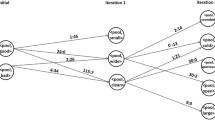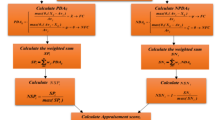Abstract
Description Logic (DL) Class Expression Learning (CEL) is a recent research topic of interest in the field of machine learning. Given a set of positive and negative examples of individuals in an ontology, the learning problem consists of finding a new class expression or concept such that most of the positive examples are instances of that concept, whereas the negatives examples are not. Therefore, the class expression learning can be seen as a search process in the space of concepts. In this chapter, the use of CEL algorithms is proposed as a tool to find the class expression that describes as much of the instances of positive documents as possible, being the main novelty of the proposal that the ontology is focused on inferring knowledge at syntactic level to determine the orientation of opinion. Furthermore, the use of CEL algorithms can be an alternative to complement other types of classifiers for sentiment analysis , incorporating such description classes as relevant new features into the knowledge base. To do so, an ontology -based text model for the representation of text documents is presented. The process for the ontology population and the use of the class expression learning of sentiment concepts are also described. To show the usefulness and effectiveness of our proposal, we use a set of documents about positive feedback focused on films to learn the positive sentiment concept and to classify the documents, comparing the results obtained against the result obtained by a C4.5 decision tree classifier, using the standard bag of words structure. Finally, we describe the problems that have arisen and solutions that have been adopted in our proposal.
Access this chapter
Tax calculation will be finalised at checkout
Purchases are for personal use only
Similar content being viewed by others
References
Chandrasekaran, B., Josephson, J.R., Benjamins, V.R.: What are ontologies, and why do we need them? IEEE Intell. Syst. Appl. 14(1), 20–26 (1999)
Chen, R.C., Huang, Y.H., Bau, C.T., Chen, S.M.: A recommendation system based on domain ontology and swrl for anti-diabetic drugs selection. Expert Syst. Appl. 39(4), 3995–4006 (2012)
Colace, F., De Santo, M., Napoletano, P., Becchi, C., Chang, S.K.: Ontological filtering for sentiment analysis. In: DMS’2012, pp. 60–66 (2012)
Gomez-Perez, A., Corcho, O.: Ontology languages for the semantic web. IEEE Intell. Syst. Appl. 17(1), 54–60 (2002)
Horridge, M., Drummond, N., Goodwin, J., Rector, A., Wang, H.H.: The manchester owl syntax. In: Proceedings of the 2006 OWL Experiences and Directions Workshop (OWL-ED2006) (2006)
Horrocks, I.: Ontologies and the semantic web. Commun. ACM 51(12), 58–67 (2008)
Horrocks, I., Patel-Schneider, P.F., Van Harmelen, F.: From SHIQ and RDF to OWL: the making of a web ontology language. Web Semant. 1(1), 7–26 (2003)
Kaur, A., Gupta, V.: A survey on sentiment analysis and opinion mining techniques. J. Emerg. Technol. Web Intell. 5(4), 367–371 (2013)
Kearney, C., Liu, S.: Textual sentiment in finance: a survey of methods and models. Int. Rev. Fin. Anal. 33, 171–185 (2014)
Knijff, J., Frasincar, F., Hogenboom, F.: Domain taxonomy learning from text: the subsumption method versus hierarchical clustering. Data Knowl. Eng. 83, 54–69 (2013)
Kohler, J., Philippi, S., Specht, M., Ruegg, A.: Ontology based text indexing and querying for the semantic web. Knowl.-Based Syst. 19(8), 744–754 (2006)
Kontopoulos, E., Berberidis, C., Dergiades, T., Bassiliades, N.: Ontology-based sentiment analysis of twitter posts. Expert Syst. Appl. 40(10), 4065–4074 (2013)
Lau, R.Y.K., Li, C., Liao, S.S.Y.: Social analytics: learning fuzzy product ontologies for aspect-oriented sentiment analysis. Decis. Support Syst. 65(C), 80–94 (2015)
Lehmann, J.: DL-learner: learning concepts in description logics. J. Mach. Learn. Res. 10, 2639–2642 (2009)
Lehmann, J., Auer, S., Bhmann, L., Tramp, S.: Class expression learning for ontology engineering. J. Web Seman. 9(1), 71–81 (2011)
Lehmann, J., Hitzler, P.: Concept learning in description logics using refinement operators. Mach. Learn. 78, 203–250 (2010)
Li, S., Liu, L., Xiong, Z.: Ontology-based sentiment analysis of network public opinions. Int. J. Digit. Content Technol. Appl. 6(23), 371–380 (2012)
Liu, B.: Sentiment Analysis and Opinion Mining. In: Synthesis Lectures on Human Language Technologies. Morgan & Claypool Publishers (2012)
Maedche, A., Staab, S.: Ontology learning for the semantic web. IEEE Intell. Syst. Appl. 16(2), 72–79 (2001)
Martin-Valdivia, M.T., Martinez-Camara, E., Perea-Ortega, J.M., Urena-Lopez, L.A.: Sentiment polarity detection in spanish reviews combining supervised and unsupervised approaches. Expert Syst. Appl. 40(10), 3934–3942 (2013)
Pang, B., Lee, L.: A sentimental education: sentiment analysis using subjectivity summarization based on minimum cuts. In: Proceedings of the ACL (2004)
Pang, B., Lee, L.: Opinion mining and sentiment analysis. Found. Trends Inf. Retr. 2(1–2), 1–135 (2008)
Pedrycz, W.: Computational Intelligence: An Introduction. CRC Press Inc, Boca Raton (1997)
Sirin, E., Parsia, B., Grau, B.C., Kalyanpur, A., Katz, Y.: Pellet: a practical owl-dl reasoner. Web Seman. 5(2), 51–53 (2007)
Tran, A., Dietrich, J., Guesgen, H., Marsland, S.: An approach to parallel class expression learning. In: Bikakis, A., Giurca, A. (eds.) Rules on the Web: Research and Applications. Lecture Notes in Computer Science, vol. 7438, pp. 302–316. Springer, Berlin (2012)
Uguz, H.: A two-stage feature selection method for text categorization by using information gain, principal component analysis and genetic algorithm. Knowl.-Based Syst. 24(7), 1024–1032 (2011)
Uschold, M., Gruninger, M.: Ontologies: principles, methods and applications. Knowl. Eng. Rev. 11(2), 93–136 (1996)
Wei, T., Lu, Y., Chang, H., Zhou, Q., Bao, X.: A semantic approach for text clustering using wordnet and lexical chains. Expert Syst. Appl. 42(4), 2264–2275 (2015)
Yin, P., Wang, H., Guo, K.: Feature-opinion pair identification of product reviews in chinese: a domain ontology modeling method. New Rev. Hypermedia Multimedia 19(1), 3–24 (2013)
Zhang, F., Ma, Z.M., Li, W.: Storing owl ontologies in object-oriented databases. Knowl.-Based Syst. 76, 240–255 (2015)
Author information
Authors and Affiliations
Corresponding author
Editor information
Editors and Affiliations
Rights and permissions
Copyright information
© 2016 Springer International Publishing Switzerland
About this chapter
Cite this chapter
Salguero, A., Espinilla, M. (2016). Description Logic Class Expression Learning Applied to Sentiment Analysis. In: Pedrycz, W., Chen, SM. (eds) Sentiment Analysis and Ontology Engineering. Studies in Computational Intelligence, vol 639. Springer, Cham. https://doi.org/10.1007/978-3-319-30319-2_5
Download citation
DOI: https://doi.org/10.1007/978-3-319-30319-2_5
Published:
Publisher Name: Springer, Cham
Print ISBN: 978-3-319-30317-8
Online ISBN: 978-3-319-30319-2
eBook Packages: EngineeringEngineering (R0)




